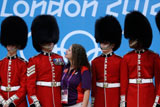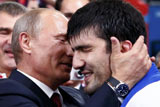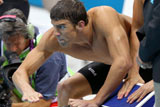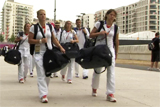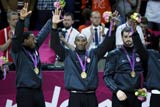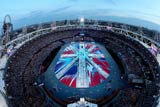UAE mindful of Ramadan challenges before London
Updated: 2012-06-07 14:47:00
(Agencies)
|
|||||||||||
Al AIN - United Arab Emirates' soccer playmaker Omar Abdulrahman is unfazed about facing Britain at the Olympics - but the All Whites' task of upsetting the hosts will be made harder by the tournament coinciding with Ramadan, the Muslim holy month of fasting.
The UAE will start the under-23 tournament against Uruguay at Old Trafford on July 26, before taking on Britain at Wembley and then Senegal in Cardiff in their final group game.
These matches will kick off in early evening when the sun is still high in the British summer sky, a major problem for the UAE's Muslim players, with Ramadan demanding the devout do not eat or drink from dawn until dusk.
Fasting will be impossible during and immediately after matches, said Abdulrahman - players typically lose about 2 litres of body fluids in sweat every game, according to a 2004 study by Loughborough University - but he and his fellow players have yet to decide whether to fast at other times. Doing so would hamper training and match preparations, putting them at a disadvantage to other teams.
"It's a personal decision - it depends on what it's like there," Abdulrahman told Reuters at his friend's home in the desert oasis city of Al Ain. "Everyone in the team knows if they can fast they will, but if they can't they won't."
Muslim clerics have weighed in on the issue, with local media reporting that the religious authorities have excused the UAE's players from fasting. Islam traditionally exempts people who are sick, pregnant or travelling.
"During the match of course one cannot fast," said Abdulrahman, 20. "Hopefully we will make it up afterwards - we will fast after the Olympics."
Soccer boom?
The All Whites reached London after going unbeaten through the Asian qualifiers, winning four matches and drawing two to top a group including Australia and Iraq, and attacking maestro Abdulrahman was undaunted at the prospect of playing at Wembley and Old Trafford.
"No, on the contrary, our dream is to reach those stadiums," said Abdulrahman. "We will enjoy it and we won't let it intimidate us. We are going there to make the country proud, our sheikhs and the whole country."
Abdulrahman is of Yemeni origin and was born in the Saudi Arabia capital Riyadh, but his footballing promise led the UAE to grant him citizenship and he and his family relocated to Al Ain, for whom he now plays.
"I represent the UAE, of course I do, it's a great honor - I am Emirati," said Abdulrahman, who also has a handful of caps for the senior national team and speaks Arabic in a near-perfect Emirati accent.
When asked how his teammates treated him as a foreign-born player, he said "I am amongst brothers".
Abdulrahman's recruitment reveals the UAE's determination to improve on its lowly soccer standing.
Off the field, the country has used its oil wealth to buy into Europe's soccer elite.
Abu Dhabi's petro-dollars propelled English Premier League outfit Manchester City to their first league title in 44 years this month, while Dubai-owned Emirates airline has naming rights at rival club Arsenal's London ground and is also the shirt-sponsor of seven-times European champions AC Milan.
But on the field, the UAE are minnows, with London the country's Olympics soccer debut, while the senior team has only qualified once for the World Cup finals, slipping out in the first round in 1990 after losing all three matches.
TINY NATIVE POPULATION
The team is ranked outside the world's top 100; and the country's tiny native population - about 90 percent of the UAE's 8.3 million people are expatriates - means it struggles to compete against Asia's traditional powerhouses such as South Korea and Japan.
Local league matches rarely attract more than a few thousand supporters, despite the likes of Diego Maradona in the dug-out and Ghana World Cup star Asamoah Gyan on the pitch.
That is changing under the guidance of Olympics coach Mahdi Ali, who led the UAE to the Asia Under-19 Championships in 2008 before moving up the age groups along with many of the players.
The Olympics will also give the UAE players a chance to shine in front of scouts from Europe's top clubs and Abdulrahman is keen to follow compatriot Hamdan al-Kamali abroad.
Kamali, 23, is the only Emirati playing in Europe, although the central defender has yet to make his senior debut since joining France's Lyon on loan from the UAE's Al Wahda Club in January.
"Playing in leagues abroad is very good thing for a player, he will get taste of real professional football and I wish for this for me," said Abdulrahman.
His cause has been helped by Gyan's presence at Al Ain. The Ghanaian plundered 22 goals in 18 games to help the club claim their ninth national title, having joined on loan from Premier League Sunderland.
"He is very down to earth which surprised us because he is such a big name in the football world," added Abdulrahman. "We learned how to be more professional in the game, how to deal with other players."
Medal Count |
||||
| 1 | 46 | 29 | 29 | |
| 2 | 38 | 27 | 22 | |
| 3 | 29 | 17 | 19 | |
| 4 | 24 | 25 | 33 | |
| 5 | 13 | 8 | 7 | |
| 6 | 11 | 19 | 14 | |


